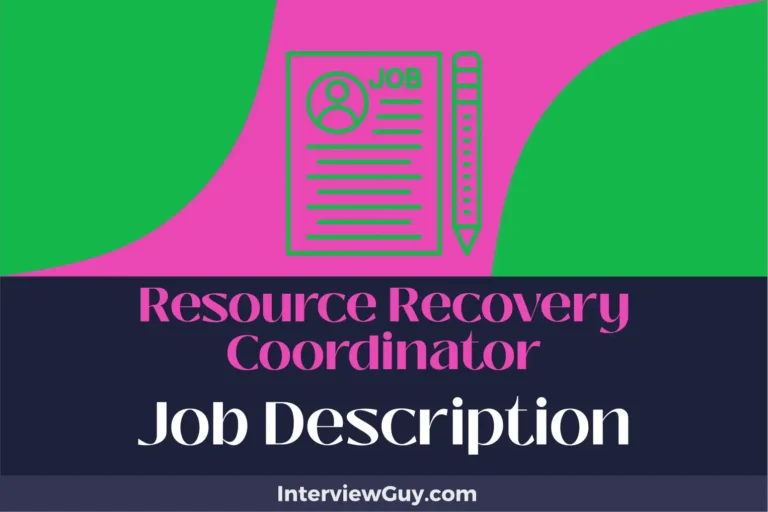Equine Therapist Job Description [Updated for 2026]

In the evolving world of animal care, the importance of equine therapists has never been more significant.
As our understanding of animal therapy advances, the need for skilled professionals who can navigate, enhance, and ensure the well-being of horses through therapeutic treatment grows stronger.
But let’s delve deeper: What does an equine therapist truly do?
Whether you are:
- An aspiring professional trying to understand the core responsibilities of this role,
- A hiring manager seeking to define the perfect candidate,
- Or simply fascinated by the intricacies of equine therapy,
You’ve landed in the right place.
Today, we present a versatile equine therapist job description template, crafted for effortless posting on job boards or career sites.
Let’s dive right into it.
Equine Therapist Duties and Responsibilities
Equine Therapists work with horses to provide therapeutic riding and other horse-related activities for therapeutic aims, including cognitive, emotional, physical and social improvement.
The duties and responsibilities of an Equine Therapist include:
- Evaluating the physical and mental health needs of clients
- Developing individualized equine therapy treatment plans
- Leading therapy sessions using horses to assist in the treatment of clients
- Monitoring and documenting the progress of clients during therapy
- Working with other healthcare professionals to provide comprehensive care
- Handling and training horses for therapeutic purposes
- Maintaining the health and well-being of the therapy horses
- Ensuring the safety of clients and horses during therapy sessions
- Providing education and support to the families of clients
- Keeping up to date with latest research and methods in equine therapy
Equine Therapist Job Description Template
Job Brief
We are looking for a dedicated and knowledgeable Equine Therapist to join our team.
The primary responsibility will be to assist patients in managing physical and emotional health issues through the use of equine-assisted therapy activities.
The successful candidate should be deeply committed to the therapeutic process, be able to build trust with patients and horses, and have a solid understanding of human behavior and horse care.
Responsibilities
- Assess patients’ physical, psychological, and emotional conditions to develop appropriate therapy plans
- Facilitate equine-assisted therapy sessions, maintaining the safety and welfare of both patient and horse
- Monitor and document patients’ progress throughout therapy sessions
- Coordinate with other health care providers and family members for holistic patient care
- Train and supervise therapy horses to ensure their appropriateness for therapeutic sessions
- Adhere to professional standards and ethical codes in the delivery of therapy services
- Participate in professional development activities to maintain current knowledge in the field
Qualifications
- Proven work experience as an Equine Therapist or similar role in therapy/counseling
- Professional certification in Equine-Assisted Therapy
- Extensive knowledge of horse behavior and horse care
- Excellent understanding of human psychology and various therapeutic techniques
- Strong interpersonal and communication skills
- Physical fitness to handle equine therapy sessions
- High level of patience, empathy, and dedication
- Bachelor’s degree in Psychology, Counseling, Social Work, or related field
Benefits
- 401(k)
- Health insurance
- Dental insurance
- Retirement plan
- Paid time off
- Professional development opportunities
Additional Information
- Job Title: Equine Therapist
- Work Environment: Predominantly outdoor, working with animals and patients in various weather conditions. Some indoor office work for case management and documentation.
- Reporting Structure: Reports to the Therapy Director or Supervisor
- Salary: Salary is based upon candidate experience and qualifications, as well as market and business considerations.
- Pay Range: $45,000 minimum to $75,000 maximum
- Location: [City, State] (specify the location or indicate if remote)
- Employment Type: Full-time
- Equal Opportunity Statement: We are an equal opportunity employer and value diversity at our company. We do not discriminate on the basis of race, religion, color, national origin, gender, sexual orientation, age, marital status, veteran status, or disability status.
- Application Instructions: Please submit your resume and a cover letter outlining your qualifications and experience to [email address or application portal].
What Does an Equine Therapist Do?
Equine Therapists, also known as equine-assisted therapists, work in a unique field of therapy using horses as a means to provide physical, emotional, and mental healing for their clients.
They design and implement equine therapy programs to cater to a variety of individual needs, including those with physical disabilities, mental health disorders, behavioral issues, and emotional trauma.
These programs can involve riding, grooming, feeding, or simply being around horses.
Physical activities with horses can help individuals develop better motor skills, balance, and physical strength.
Emotional connections established with horses can also promote confidence, self-esteem, and emotional well-being.
Equine Therapists work closely with other healthcare professionals such as psychologists, social workers, and physical therapists to create a comprehensive therapeutic plan for each client.
They are also responsible for ensuring the safety of both the client and the horse during therapy sessions.
This includes assessing a client’s abilities, properly fitting riding equipment, and continuously monitoring interactions between the client and the horse.
In addition to therapy sessions, Equine Therapists also manage the care and training of the therapy horses, which can include feeding, grooming, and exercise routines.
Equine Therapist Qualifications and Skills
An Equine Therapist should have a unique set of skills and qualifications to provide therapeutic treatment to clients using horses, including:
- Comprehensive knowledge of equine behavior and care to ensure the safety of both the horse and the client.
- Thorough understanding of different therapeutic techniques and how to incorporate equine activities into therapy sessions.
- Strong interpersonal skills to build relationships with clients and work effectively with a team of other healthcare professionals.
- Empathy and patience to provide support to clients who may be dealing with physical, emotional, or mental health challenges.
- Excellent communication skills to listen and understand client needs, explain therapy procedures, and provide feedback to clients and their families.
- Problem-solving skills to adapt therapy plans to individual client needs and respond effectively to unexpected situations or challenges.
- Physical fitness and agility to handle horses and assist clients during therapy sessions.
- Ability to maintain client confidentiality and handle sensitive information with discretion.
Equine Therapist Experience Requirements
Equine Therapists typically begin their career paths with a bachelor’s degree in a relevant field such as psychology, social work, or equine science.
During their studies, they may gain some practical experience through internships or part-time jobs related to equine therapy or animal-assisted therapy.
In addition to academic learning, many Equine Therapists gain hands-on experience by volunteering at horse stables, equestrian centers, or therapeutic riding centers, which allows them to understand horse behavior, horse care, and safety procedures around horses.
Following their degree, professionals pursuing a career as an Equine Therapist often require a minimum of 2-3 years of experience working in a therapeutic environment, preferably with horses.
Those with more than 5 years of experience might have advanced skills in equine-assisted therapy, and could have had the opportunity to work with various patient demographics.
They may also have experience managing a team or running therapeutic programs, making them suitable for senior or supervisory roles.
Furthermore, some roles may require certified therapeutic riding instructor credentials from a recognized body, such as PATH Intl.
(Professional Association of Therapeutic Horsemanship International).
Each state may have specific licensing requirements for therapists, and additional certification in equine therapy may also be required, such as the Equine Assisted Growth and Learning Association’s (EAGALA) certification program.
Equine Therapist Education and Training Requirements
Equine Therapists usually start their career journey with a bachelor’s degree in a field related to animal science, veterinary medicine, psychology, or therapy.
Individuals seeking this career often benefit from coursework in equine sciences, including equine anatomy and physiology, equine care and management, and equine behavior.
This role requires strong experience with horses and a solid understanding of their behavior and body language.
Therefore, practical experience such as horse riding, volunteering at stables or working with a veterinarian can be beneficial.
Following their undergraduate studies, aspiring Equine Therapists often enroll in a graduate program or certification course specifically focused on equine therapy.
These specialized programs combine theoretical knowledge about therapeutic methods with practical training in horse handling and therapy session management.
In addition to educational requirements, many positions require equine therapists to be licensed or certified.
This often involves passing an exam and completing a certain number of supervised clinical hours.
Continuing education is also crucial in this field to stay updated with the latest research and therapeutic techniques involving horses.
While not mandatory, professional certification in equine-assisted therapy from recognized organizations can enhance credibility and employment prospects.
Equine Therapist Salary Expectations
An Equine Therapist can expect to earn an average salary of $45,000 (USD) per year.
This salary can vary significantly based on the therapist’s years of experience, level of education, and location.
Specializations within the field of equine therapy may also impact salary expectations.
Equine Therapist Job Description FAQs
What qualifications does an Equine Therapist need?
Equine Therapists typically need a bachelor’s degree in equine studies, psychology, or a related field.
They should also have a certification from a recognized body such as the Equine Assisted Growth and Learning Association (EAGALA).
Additionally, experience with horses and a solid understanding of horse behavior is essential for this role.
What are the key responsibilities of an Equine Therapist?
An Equine Therapist uses horses to provide therapeutic healing to individuals with mental, emotional, or physical disorders.
Their responsibilities include creating therapy plans, leading patients in interacting with horses, observing and interpreting the patient’s behavior with horses, and adjusting therapy plans as needed.
What skills are needed to be a successful Equine Therapist?
Equine Therapists should have excellent interpersonal and communication skills as they work with a range of patients and other healthcare professionals.
They should also have a deep understanding of horse behavior and equine care.
Empathy, patience, and a genuine desire to help others are key qualities for success in this role.
What should you look for in an Equine Therapist resume?
An ideal Equine Therapist resume should showcase a degree in a related field and a relevant certification.
It should also demonstrate experience working with horses and providing therapy to individuals.
Look for evidence of interpersonal skills, empathy, and patience.
How challenging is it to hire an Equine Therapist?
The pool of qualified Equine Therapists is relatively small, making the hiring process potentially challenging.
Employers may need to look beyond the local area or consider offering attractive benefits to draw candidates.
Furthermore, employers should ensure they have the necessary facilities to accommodate equine therapy.
Conclusion
So there you have it.
Today, we’ve unraveled the complexities of being an equine therapist.
And guess what?
It’s not just about riding horses.
It’s about building healing relationships, one horse and human interaction at a time.
With our top-notch equine therapist job description template and real-world examples, you’re fully equipped to make your next move.
But why stop there?
Delve further with our job description generator. It’s your next step to precision-crafted listings or refining your resume to absolute brilliance.
Remember:
Every interaction with a horse is a part of a larger healing journey.
Let’s shape that journey. Together.
How to Become an Equine Therapist (Complete Guide)
Danger as a Daily Dose: Unveiling the World’s Most Fearless Careers
Job Satisfaction Heroes: The Most Fulfilling Careers



![Harp Workshop Clinician Job Description [Updated for 2026]](https://interviewguy.com/wp-content/uploads/2024/07/harp-workshop-clinician-job-description-768x512.webp)


